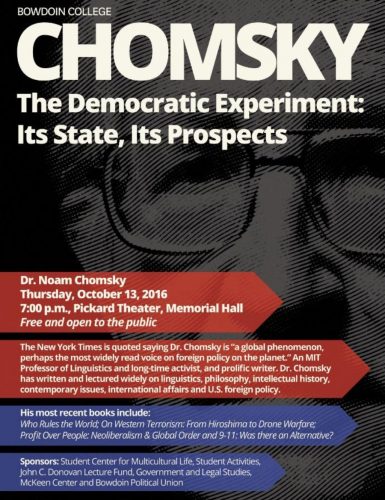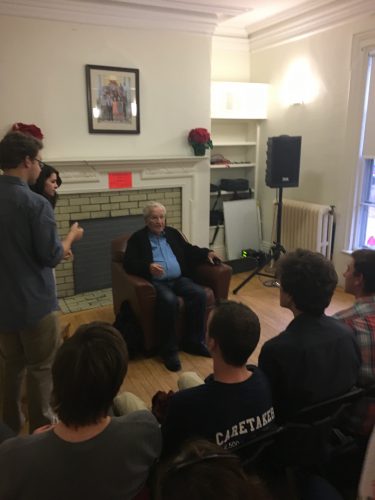Chomsky on Bought Elections, Superficial Media, and Other Threats
By Tom Porter
Scholar and political activist Noam Chomsky visited campus recently to share his thoughts on American democracy and other issues. MIT Professor Emeritus Chomsky—who has written more than 100 books on topics such as linguistics, war, politics, and mass media—is regarded as an outspoken critic of American foreign policy and the US political system.
His lecture October 13, 2016, in Pickard Theater, Memorial Hall, which was full to capacity, was titled The Democratic Experiment: Its State, Its Prospects. It was sponsored by the Student Center for Multicultural Life, Student Activities, the John C. Donovan Lecture Fund, Department of Government and Legal Studies, the McKeen Center for the Common Good and Bowdoin Political Union.
Earlier, in a more informal setting, he met with about sixty students in a question-and-answer session at Burnett House. Over the course of the two events, Chomsky answered addressed a range of topics, from carbon taxes to international conflicts to free speech on campuses.
The central message of his lecture was that American democracy has been flawed from the beginning. “Our elections are largely bought,” he said, pointing out that the poorest 70 percent of Americans are disenfranchised by policy decisions that are driven by money. He went on to say that public opinion does not generally match policy decisions in government, and that the public interest is only advanced if it aligns with the interests of the wealthy.
Criticizes mass media, US politics
Chomsky also took aim at the mass media, whose role, he said, is to “focus people on the superficial things in life,” allowing the elite to maintain control of people and policy by shaping public opinion. He talked about what he sees as the current crisis of democracy, sustained by a political system in which personalities are more important than issues. Addressing the current presidential election race, Chomsky said GOP hopeful Donald Trump “isn’t wrong” when he describes the system as “rotten” and says it must be dismantled. Chomsky also said the “Republican Party is committed to the destruction of the species as quickly as possible,” because of its reluctance to address climate change and other issues. He was also critical of Democratic candidate Hillary Clinton, whom he described as representing that same, old, system.

Carbon taxes, nuclear threat
During the Q&A session, Chomsky was asked his opinion on carbon taxes as a way to address climate change. He described the taxes as “a sensible approach but not the whole answer” to the challenge of climate change, which he described as the biggest threat to the survival of humanity. Ultimately however, Chomsky said it’s wrong to rely on market-based solutions to address the climate issue: “Decisions have to be institutional rather than market-based as market systems are inherently self-destructive,” he said.
Nuclear fears
The other serious threat to the future of mankind is that of a nuclear war with Russia: a point stressed by Chomsky at both events. When asked his views on the threat posed by Moscow’s increasingly belligerent stance on the world stage, he said: “We’re getting very close to nuclear war, raising tensions enormously, and leading to the possibility of accidental war, which could escalate to total destruction.” Chomsky said it was a miracle we survived the Cold War, and the many instances when “the world came within minutes of accidental decisions that would have sparked a nuclear war.”
He blamed East and West for fueling tensions by building up forces on both sides of the Russian border in eastern Europe. NATO has combat brigades operating just hundreds of meters from the border, said Chomsky, while Russian jets are buzzing US planes and ships. “It could blow up at any minute,” he warned. This led him talk about the situation in Syria, where Chomsky described the bombing of Aleppo by the Syrian and Russian air forces as “monstrous.” But, he said, there’s nothing the US or her partners can do about it, at least in military terms, because that would mean effectively “blowing up the world.”
The terror threat, free speech and Trump
On the issue of confronting terrorism, Chomsky was critical of the US policy of going after terror leaders. “Hillary Clinton has talked of the need to kill (Islamic State leader Abu Bakr) al-Baghdad with a drone attack, but that is the worse thing you could do,” he said, “as he would replaced by somebody younger, more violent, and who may want to make an alliance with Al Qaeda. Violence does not work.” Chomsky talked of a phenomenon called the “kill chain,” where the targeted killing of terror, and drug cartel leaders, causes them to be replaced by a somebody even worse.
One student asked Chomsky what he thought of the conflicts between free speech and social justice activism that’s being played out on many college campuses. He said he can understand the reasons behind the activism, but believes that free speech should be protected, even if it expresses viewpoints you might find objectionable. There is a limit however, he added: For example a poster saying “kill all jews”, or “kill all muslims” should not be allowed, “but there have to be very strong reasons to restrict free speech.”
When asked his thoughts on the rise of populism in US politics, Chomsky said “populist politics tend to be adopted by white people, featuring elements of nationalism and racism.” He described the US as the most white supremacist nation in the world, whose inherent racism is being fueled by a fear among segments of the white population that they will soon be a minority. “Wages are stagnating,” he said, “and hopes for the future are declining.” This aggrieved white population, said Chomsky, has provided Republican presidential candidate Donald Trump with a bedrock of support. “He (Trump) exaggerates his supporters’ grievances so they blame not those who are really responsible for their predicament, but those who are even poorer and worse off than they are.”
There is some hope for the future however, said Chomsky, and that lies with the younger generation who he said must pressure their leaders to enact policies that are fair to everyone.
With additional reporting by Henry Bredar ’19